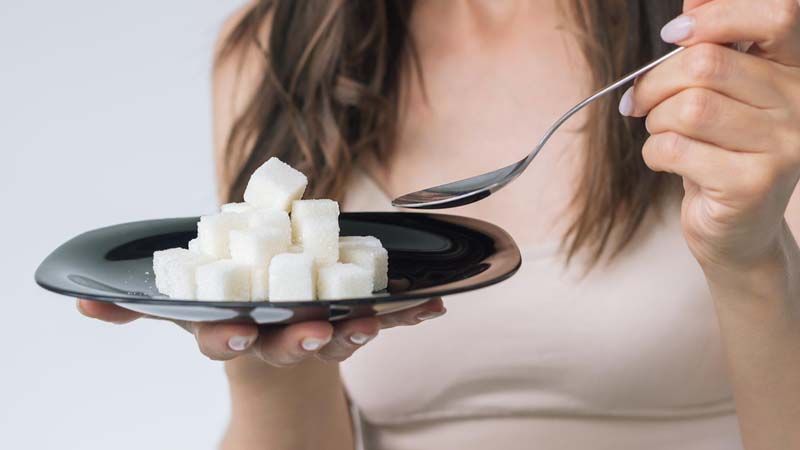Reasons Why You Crave Sugar When Feeling Low Or Stressed
- 1 month ago
Ever found yourself reaching for a chocolate bar after a stressful meeting or craving a sugary treat when you’re feeling down? You’re not alone. Sugar cravings during moments of emotional turmoil are incredibly common, and they’re not just about a lack of willpower—they’re deeply tied to how your body and mind respond to stress.
In this blog, we’ll uncover the science behind sugar cravings, explore the emotional triggers that drive them, and share strategies to take control without feeling deprived.
The Science of Sugar Cravings
1. Stress and Cortisol’s Role in Cravings
Stress triggers the release of cortisol, often referred to as the “stress hormone.” Cortisol’s primary role is to help your body deal with challenges by increasing energy availability. Since sugar is a quick source of energy, your brain signals the need for it when cortisol levels spike.
It’s a survival mechanism dating back to ancient times when humans faced physical threats and needed immediate energy to fight or flee. Today, though, the "threats" are often deadlines or emotional stress, but your body reacts the same way.
2. Sugar and the Brain’s Reward System
Sugar isn’t just about calories—it’s about chemistry. Your brain releases dopamine, a chemical linked to reward and pleasure, when you eat sugar. This produces a "feel-good" sensation, although a brief one.
The problem? Your brain loves this reward so much that it starts to associate sugar with stress relief. Over time, this can create a feedback loop where stress automatically triggers sugar cravings.
3. The Emotional Comfort of Sugar
Have you ever noticed that you don’t crave broccoli or quinoa when you’re stressed? That’s because sugary foods are often tied to positive memories. Think about childhood treats after a long school day or celebrations filled with cakes and desserts. These emotional connections make sugar feel like a source of comfort, especially during tough times.
The Hidden Triggers Behind Sugar Cravings
1. Blood Sugar Roller Coaster
Stress can cause fluctuations in blood sugar levels, leading to fatigue and a sense of low energy. When this happens, your body craves sugar to quickly restore balance. However, the energy spike from sugar is short-lived and often followed by a crash, making you crave even more. [Also Read: How To Deal With Blood Sugar Spike After Eating?]
2. Habitual Coping Mechanisms
Do you always reach for chocolate when you're upset? Over time, these choices become habitual. Your brain begins to associate certain emotions—like sadness or frustration—with sugary rewards, creating a cycle that’s hard to break.
3. Poor Sleep Exacerbates Cravings
Stress often disrupts sleep, and poor sleep affects your hunger hormones. Leptin, the hormone that indicates fullness, falls while ghrelin, the hunger hormone, rises. This imbalance can make sugary foods even more appealing.
Also Read: Are you Aware Of The Health Risks Of Added Sugars?
Why Sugar Feels Like the Solution?
1. Instant Energy, But at a Cost
Sugary foods are a quick source of glucose, which your body uses as fuel. When you’re mentally or physically exhausted, sugar feels like the easiest way to refuel. However, the temporary boost comes at a cost: an energy crash that leaves you feeling worse.
2. Stress Reduces Serotonin
Serotonin, often called the “happiness chemical,” plays a major role in regulating mood. Stress can deplete serotonin levels, and since carbohydrates (including sugar) temporarily boost serotonin, they become an attractive option during emotional lows.
3. Underlying Nutrient Deficiencies
Sometimes, sugar cravings can signal nutrient deficiencies like magnesium, chromium, or zinc, which are essential for regulating blood sugar. Stress can worsen these deficiencies, making your body crave sugar even more.
Relatable Scenarios
- The Post-Work Crash: You’ve had a stressful day at work, skipped lunch, and now all you can think about is dessert.
- The Breakup Binge: After an emotional breakup, you seek solace in a tub of ice cream. The emotional connection with sugary comfort food provides temporary relief from pain.
- The Study Session Snack: Before exams or a deadline, you find yourself snacking on candy. Stress and mental exhaustion amplify your cravings for sugar to keep going.
Also Read: Why Do I Feel Nauseous After Eating High Sugar But I'm Not Diabetic?
How to Manage Sugar Cravings?
While sugar cravings during stress are natural, there are healthier ways to manage them without giving in every time.
1. Understand the Cravings
The first step is to acknowledge your cravings without judgment. Instead of fighting them, pause and ask yourself:
- “Am I really hungry, or is this emotional eating?”
- “What triggered this craving?”
2. Choose Healthier Alternatives
When the craving hits, try:
- Fruits: Naturally sweet and full of fiber.
- Dark Chocolate: Rich in magnesium and lower in sugar than milk chocolate.
- Nuts and Seeds: Provide healthy fats and proteins for sustained energy.
3. Balance Your Meals
Prevent blood sugar dips by eating balanced meals with:
- Protein (eggs, lentils, chicken)
- Healthy fats (avocado, nuts)
- Complex carbs (brown rice, quinoa)
4. Practice Stress Management
Reduce stress and cortisol levels through:
- Exercise: Even a 10-minute walk can lower stress.
- Meditation or Deep Breathing: Calms your mind and reduces cortisol.
- Journaling: Helps process emotions without turning to food.
5. Sleep Well
Prioritize 7-9 hours of sleep each night. Good sleep balances hunger hormones and reduces stress-induced cravings.
6. Limit Processed Sugar Gradually
Cutting back on sugar abruptly can make cravings worse. Reduce it gradually and prioritize complete, nutrient-dense foods.
Final Thoughts
Sugar cravings during stress or emotional lows are your body’s way of signaling a need for comfort and energy. While indulging occasionally is fine, understanding the reasons behind your cravings empowers you to make healthier choices.
Instead of relying on sugary treats, focus on managing stress and nourishing your body with balanced meals and mindfulness practices. Over time, you’ll find that you crave sugar less and feel more in control.









